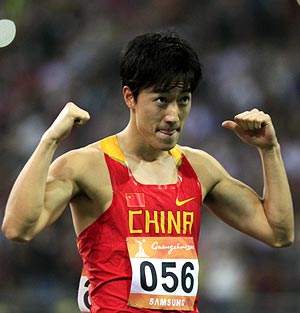 | « Back to article | Print this article |
China's Liu Xiang clinched his third straight 110m hurdles title at the 2010 Asian Games in Guangzhou on Wednesday to win a small measure of redemption after his disastrous Olympic title defence on home soil two years ago.
Having disappointed millions when he limped out of Beijing's "Bird's Nest" stadium at his home Olympics, Liu, 27, left a crowd of 73,000 at Guangzhou's Aoti Stadium in ecstasy when he blitzed a weak field to cross the line in front of compatriot Shi Dongpeng.
Hundreds of millions more watched on television as Liu posted a time of 13.09 seconds, his best in years, and left himself seeing a flicker of gold on the London horizon.
"I believe I can (win at the 2012 Olympics), but 'can' is just a word," the 2004 Athens gold medallist told reporters.
"No matter what I will make every effort.
 "Of course I find it hard to imagine that I could still make it under 13 seconds but with this evening I am feeling more and more confident and I think I can do it."
"Of course I find it hard to imagine that I could still make it under 13 seconds but with this evening I am feeling more and more confident and I think I can do it."
Liu's time was still well off his personal best of 12.88, a then world record set at a 2006 grand prix in Lausanne, Switzerland. Cuban Dayron Robles owns the current mark of 12.87, set months before taking Liu's Olympic title.
The first Chinese man to win an Olympic track and field title, Liu's shock gold at Athens and his subsequent world title in 2007 made him a rare commodity, a dominant Chinese athlete in a high-profile sport.
Feted with multi-million dollar endorsement deals and handed a post on an advisory body to China's rubber-stamp parliament, Liu's halo slipped sharply, however, when he pulled out of his Olympic title defence just before his first heat, citing a previously undisclosed Achilles injury.
Secretive and messy preparations in the lead-up, and his long recovery from injury after, fuelled speculation that the hurdler had been emotionally damaged by his Beijing breakdown.
His results from six races on the comeback trail prior to Wednesday -- a time of 13.15 at a Shanghai grand prix last year the best -- did little to dispel the image of fragile runner whose world-beating days were behind him.
But after soaking up cheers while parading around Aoti stadium with a national flag draped over his shoulders, Liu dismissed his critics as "noise".
"I believe I am already a successful athlete and will definitely encounter some unharmonious noises, so I just let it go," he said.
"Only a small proportion of people say this. This proves the old saying that envy leads to hatred.
"It's no big deal. I believe that I should just happily be myself and continue to prove myself."
GOLD GLUT
Liu's triumph capped a day of celebrations for the Chinese team, who roared to 173 gold medals after clinching titles in boxing, diving, karate and beach volleyball.
They remain only 10 shy of their record of 183 at the 1990 Games in Beijing and should have little trouble reeling that in with three days of competition left.
Away from the Chinese party, the most severe military flare-up between North and South Korea in decades continued to rankle athletes at the Asian Games on Wednesday, and organisers banned a second Uzbek athlete for doping.
A day after North Korea rained shells on a South Korean island, setting houses ablaze and killing two soldiers, wrestlers representing the war-time foes grappled in a tense four-minute bout that ended in a brief and awkward embrace.
"I wanted to beat him due to yesterday's issue, but I lost," said South Korea's Kim Dai-sung after losing his men's 66kg freestyle bout to North Korea's Yang Chun-song.
At the Guangzhou Chess Institute on Wednesday, it was a battle of minds over matter, as South Korea's women plotted their opponents' downfall in the ancient Chinese chess game of Go.
As a US aircraft carrier group steamed towards Korean waters on Wednesday, South Korea's Lee Min-jin quietly won a prolonged territorial struggle over the chessboard to beat North Korea's Hwang Kyong-ju and spearhead her team's victory.
"They were speaking together in the athlete's lounge before the contest like nothing had happened," said Kim Soh-yeon, a translator for the South Koreans.
Greco-Roman wrestler Jakhongir Muminov tested positive for methylhexaneamine, the same banned stimulant that led to his unrelated Uzbek team mate Shokir Muminov losing his judo silver medal last week. The Olympic Council of Asia urged the Uzbek team to probe whether more athletes were doping within their ranks.
